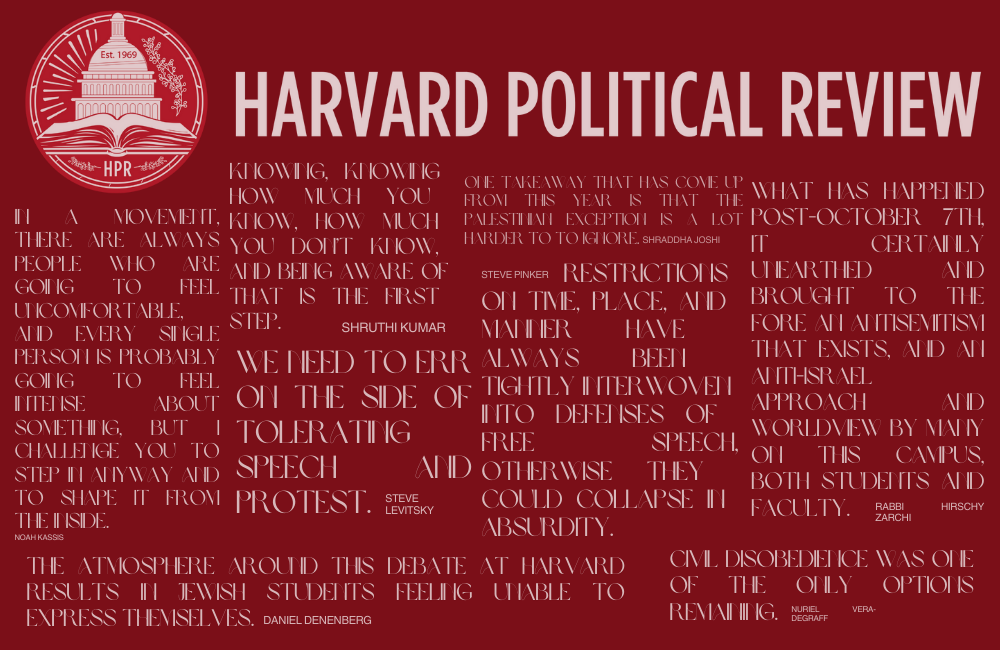The Harvard Political Review is proudly a non-ideological, non-partisan publication. This paradigm is the heartbeat of our organization, our guidepost as we seek to analyze the salient issues of our political reality with nuance and completeness.
Though we remain untethered to any one political stance, this does not mean the publication is value neutral.
The HPR values truth telling. The HPR values having difficult, but important conversations. Above all, The HPR values creating a space for writers and readers alike to think critically and carefully about politics.
It is in that spirit that the editorial leadership of The Harvard Political Review presents a series of interviews with Harvard students, faculty, campus leaders, and affiliates examining perspectives on the war in Gaza, the pro-Palestinian Gaza solidarity encampment in Harvard Yard, and the Harvard administration’s response to the conflict in the Middle East.
These events have inflamed Harvard’s campus and the greater world. Harvard’s 30th president, Claudine Gay, resigned after a tumultuous term that included a controversial Congressional testimony during which she declined to state whether Harvard would punish students who “called for the genocide of the Jews.” Harvard students were doxxed after student organizations published a highly-criticized letter soon after the October 7th Hamas attacks, in which they held “the Israeli regime entirely responsible for all unfolding violence.” Following the letter’s publication, digital billboard trucks appeared in Harvard Square bearing the names and faces of students supposedly affiliated with the letter, alongside the phrase “Harvard’s Leading Antisemites.” At the time of the publication of this series, the university remains at odds with itself: The Harvard Corporation, one of the university’s governing boards, rejected an attempt by the Faculty of Arts and Sciences to allow 13 Harvard College seniors — whose degrees were being withheld by the Harvard College Administrative Board due to their involvement in the Gaza solidarity encampment — to graduate.
Questions on topics ranging from antisemitism and anti-Arab and anti-Muslim bias to free speech to university governance have permeated the collective consciousness of Harvard affiliates, dividing communities, and, for some, calling into question whether the university is capable of upholding its own core commitment to Veritas — to truth.
Beneath the headlines, though, are real individuals, each with a complex experience related to the war and accompanying Harvard events. Over the past few weeks, The HPR met with some of those individuals to record their stories. As a publication committed to incisive political analysis, we felt it our duty to hold each of our interviewees’ views under close scrutiny. From that aim emerged a series of seven fruitful conversations, each illuminating a unique view on Israel, Palestine, the ongoing war, campus demonstrations, and more.
I encourage our readers to read every interview, even — and especially — those which present opinions they disagree with. To do so would be to honor the aim of this project: While a mere set of interviews is wholly insufficient to capture the complexity of October 7, the war in Gaza, and their devastating effects at Harvard and beyond, taking the series in its totality brings us all one step closer to the understanding, compassion, and common humanity this tragedy necessitates.
The HPR thanks the interviewees who offered their time, reflections, and vulnerability to our publication. And The HPR thanks our readers for engaging alongside us in thoughtful discourse, adopting the ideals of intellectual vitality and the free exchange of ideas that drive our publication and underpin political journalism.
All views expressed in the series are those of the interviewees. Statements do not reflect the views of The Harvard Political Review nor the individual interviewers.
President




